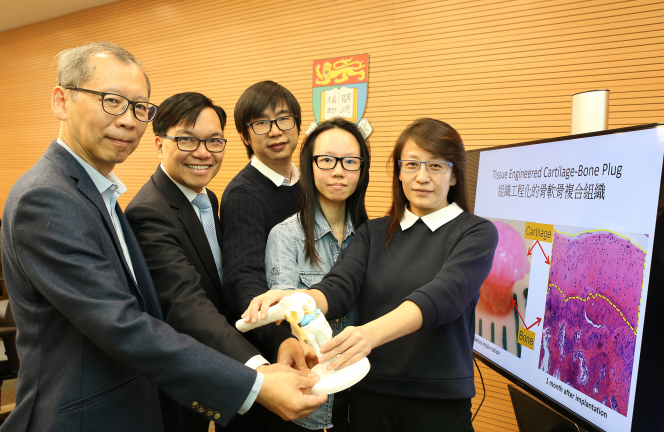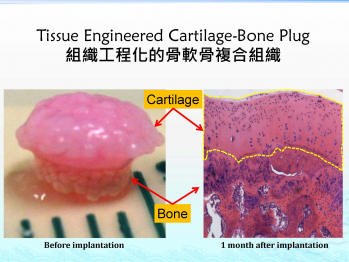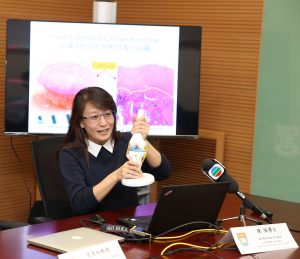Media
HKU biomedical engineers develop new cartilage regeneration technology to grow cartilage from one’s own cells for cartilage repairs
16 Dec 2015

HKU biomedical engineering research team develops a new cartilage regeneration technology for cartilage repairs. (From left) Dr Sunny Cheng; HKU Associate Vice-President (Research) and Director of Technology Transfer Office Professor Paul Y.S. Cheung; Dr Daniel Chik, Dr Annie Cheng and Dr Barbara Chan of the Department of Mechanical Engineering.
A University of Hong Kong research team, led by Dr Barbara Chan, Associate Professor of the Department of Mechanical Engineering, has developed a new cartilage regeneration technology to grow cartilage tissues out of cells taken from one’s body.
The cells, in particular stem cells extracted from one’s bone marrow, can be grown into cartilage tissues of the shape and size fit for cartilage repairs and replacements. Since the replacement parts are fully biocompatible, patients could be benefited from rapid healing without the need to harvest donor cartilage from the patients.
Dr Chan’s team is one of the world’s teams pioneering in cartilage tissue engineering, and is the first to develop the technology to such an advance stage. Research on the new technology by the team has entered the stage ready for technology transfer and commercialization.
Cartilage injuries and diseases are very common. About 40% of adults over 65 years old have osteoarthritis. Cartilage has no nerves and therefore does not cause pain until the cartilage is gone and the bone underneath starts to be affected. Cartilage has no blood vessels and therefore cannot heal on its own once injured. In the worst case, the knee joint has to be replaced by an artificial joint.
There have been many attempts to repair damaged cartilages, but results remain unsatisfactory. It is generally known that a defect is best replaced by a healthy cartilage transplant, which must be complete with underlying bone tissues, so as to protect the integrity of the entire cartilage tissue. A surgical procedure, known as osteochondral autograft transplantation, harvesting a graft from one part of the joint, and transplanting this autograft to replace the damaged cartilage, is recognized as the clinical gold standard for repairing cartilage because the outcomes are the best among other approaches. Nevertheless, this procedure leaves the autograft donor sites injured that may lead to abnormalities including chronic pain and degeneration.
Tissue Engineering applies the principles and methods in both Engineering and Life Science disciplines to develop biological substitutes to replace the lost structure and function of defective tissues. A usual way is to use the patients’ own cells such as stem cells, together with the right signals and appropriate biomaterials and grow them into a three dimensional tissue-like structure until it becomes at least partially functional, before replacing the defective tissue.
The Tissue Engineering Laboratory at the University of Hong Kong, in the last eight years, has developed several patented platform technologies including “microencapsulation” and “complex tissue engineering” technologies, enabling researchers to grow complex tissues, which consist of multiple tissue components. The core technology is to grow cartilage tissues complete with underlying bone tissues in vitro, using the patient's own stem cells isolated from clinically accessible sources such as bone marrow. This "complex tissue plug" mimics the structural organization of native cartilage-bone tissues. By doing so, autografts are not required. Animal studies in rabbits have shown that replacing defects in knee joint cartilage with these tissue engineered cartilage-bone tissue plugs gives rapid and sustained regeneration of high quality cartilage with structure, composition and mechanical properties comparable to that of the clinical gold standard autografts. The use of these regenerative complex tissue plugs allows surgeons to use the same autograft surgical procedure to repair cartilage damages without the need to hurt the patients’ own cartilage. Currently, by working with orthopaedic surgeons, the research team is preparing to translate this technology for human applications.

(Left) In animal trial (rabbit), Mesenchymal stem cells isolated from bone marrow, together with biomaterials, were grown into a Tissue Engineered Cartilage-Bone plug. (Right) One month after transplantion in a defect in animal’s knee joint, hyaline cartilage structure with proper structural organization, intact bone-cartilage interface and underlying bone tissue were regenerated.
Dr Chan said the the technology would offer a novel solution to the treatment of cartilage related diseases. She said: "Damaged cartilages cannot self-heal. In our lifetime, our cartilages may be damaged, (through daily wear and tear, trauma or disease) to the point which can cripple us. As we live longer, grow fatter, and have sportier lifestyle, problems of bad knees (and other joints) can only get worse," and added: "We are developing cartilage using advanced tissue engineering to replace the damaged cartilage of the knee. We grow the cartilage tissues in vitro using the patient's own adult stem cells, and use the engineered pristine cartilage to replace the damaged cartilage tissues. We are in the process of translating our technology for use on human."
The cartilage regeneration technology can be applied in treating sports injuries and trauma, and have the potential to extend to other cartilage diseases including osteoarthritis and degeneration. The ultimate goal is to develop this technology into the dominant method for cartilage repair and an early intervention procedure, which may prevent degeneration of the joint.
Recently, through the Technology Start-up Support Scheme for the Universities (TSSSU) programme, established under the Innovation and Technology Fund, two previous HKU PhD students and a business partner, together with Dr. Chan, have established a startup company (Living Tissues Company Limited). The company is now an incubatee of the IncuBio programme at the Hong Kong Science Park. The startup aims to take the results to the next phase of development and translate this technology into real applications.
The commercialization of this technology was assisted by the HKU Technology Transfer Office and Versitech Limited, the commercial arm of the University operating on a non-profit making basis to promote technology innovations by HKU researchers.
For the powerpoints on the new technology, please click here.
For the powerpoints on the HKU Techonolgy Transfer Office, please click here.
About Technology Transfer Office at HKU
The Technology Transfer Office (TTO) manages the use of the intellectual property assets of HKU by providing patenting, licensing, and other commercialization support to our researchers. Acting as the bridge linking HKU to society in the area of technology commercialization, TTO facilitates industries and businesses to access HKU’s powerhouse of knowledge, innovation, and expertise through close collaboration. For HKU’s patents and technologies, please visit http://www.tto.hku.hk. Potential industrial/ business partners who are interested to discuss commercialization opportunities are welcome to contact TTO by email at info@tto.hku.hk or telephone at (852) 2299 0111.
For media enquiries, please contact Dr Barbara Chan (Tel: 28592632, Email: bpchan@hku.hk); or Ms Melanie Wan, Communications and Public Affairs Office, HKU (Tel: 2859 2600 / Email:melwkwan@hku.hk) or Ms Julie Chu, Communications and Public Affairs Office, HKU (Tel: 2859 2437/ Email: juliechu@hku.hk).

